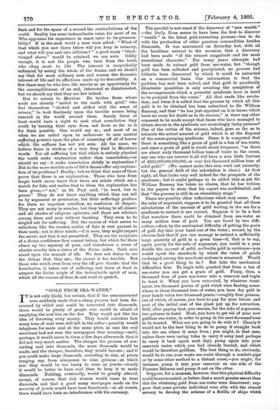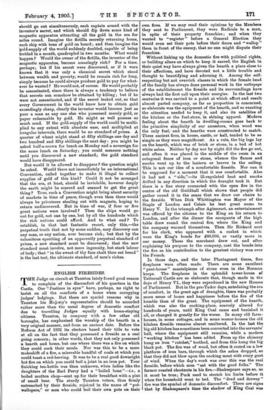I T is not only likely, but certain, that if the
announcement were suddenly made that a cheap process had been dis- covered by which coal could be converted into diamonds, there would be plenty of people who would be afraid of emptying the coal-box on the fire. They would not like the idea of throwing away money. They would calculate bow many tons of coal were still left in the cellar—possibly would telephone for more coal at the same price, in case the coal merchant had not seen the newspapers that morning—until, perhaps, it would occur to them a few days afterwards that it did not very much matter. The cheaper the process of con- verting coal into diamonds, the more diamonds would be made, and the cheaper, therefore, they would become ; and if you could make large diamonds, according to size, at prices ranging, say, from ninepence to nine guineas—at which size they would be too heavy to wear as jewels—clearly it would be better to burn coal than to keep it to make diamonds. Nothing, eventually, would be greatly altered, except, of course, that rich women would cease to wear diamonds, and that a good many mortgages made on the security of jewels would have been foreclosed,—at all events, there would have been no interference with the currency.
The parallel is not exact if the discovery of "new wealth" —the Daily News seems to have been the first to discover " wealth" in the latest gold-extracting process—has to do with the production of other precious commodities besides diamonds. It was announced on Saturday Last, with all the headlines natural to the occasion, that a discovery had been made "of the utmost magnitude and the most sensational character." For many years attempts had been made to extract gold from sea-water, but ," though gold has been collected and precipitated, no process had hitherto been discovered by which it could be extracted on a commercial basis. Our information is that the problem has now been solved, and that gold in practically illimitable quantities is only awaiting the completion of the arrangements which a powerful syndicate have in band to be pumped from the ocean." All that reads like revolu- tion; and when it is added that the process by which all this gold is to be obtained has been submitted to Sir William Ramsay, and that " he has just reported on it in terms which leave no room for doubt as to its success," is there any other comment to be made except that those who have managed to obtain shares in the syndicate are exceedingly lucky persons? One of the critics of the scheme, indeed, goes so far as to estimate the actual amount of gold which is at the disposal of the ocean-pumping syndicate. Since it is computed that there is something like a grain of gold in a ton of sea-water, and since a grain of gold is worth about twopence, " as there are about sixty thousand billion tons of water in the ocean, any one who can recover it all will have a nice little fortune of £625,000,000,000,000, or over five thousand million tons of solid gold!" (We cannot make this sum work out correctly, but the general drift of the calculation is clear.) At first sight, all that looks very well indeed for the prospects of the syndicate ; but it ought perhaps to be added that as yet Sir William Ramsay has taken no shares, that he has written to the papers to state that his report was confidential, and that " the process is still in an elementary stage."
There are possibly other reflections which may occur. For the sake of argument, suppose it to be granted that all these calculations of the amount of gold waiting in the sea for a syndicate to extract it are correct. Suppose it to be a fact that somehow there could be obtained from sea-water so many million tons of gold. You are faced by two diffi- culties,—first, by the mechanical difficulty of getting the grain of gold dry into your hand out of the water; second, by the obvious fact that if you can manage to extract a sufficiently large quantity of gold in a given time—if, that is to say, again purely for the sake of argument, you could in a year double the amount of solid, malleable gold in existence—you would upset the standards by which the value of goods exchanged among the merchant nations is measured. Would that be a good thing to do ? But take the mechanical difficulties first. To begin with, granted that from a ton of sea-water you can get a grain of gold. Pump, then, a thousand tons of pure sea-water into a reservoir and begin to treat it. When you have extracted, by whatever treat- ment, the thousand grains of gold which were floating some- where in those thousand tons of water, you have dry gold in your hands value two thousand pence,—roughly four guineas, out of which, of course, you have to pay for your labour and part of the initial cost of the plant put up for extraction. Still, after paying that, you remain, for the sake of argument, two guineas in band. Next, you have to get rid of your now goldless sea-water, in order to pump in the next thousand tons to be treated. What are you going to do with it? Clearly it would not be the best thing to do to pump it straight back into the sea where it came from ; you might, in that case, unless there were racing tides to carry it away (and perhaps to carry it back again next day), pump again into your reservoir water which you had already treated, and which would be therefore goldless. The best thing to do, obviously, would be to run your waste sea-water through a conduit-pipe or by some other method to a distant coast,—you might, for instance, pump it into your reservoir on one side of the Panama Isthmus and pump it out on the other.
Suppose, for a moment, however, that this -physical difficulty could be surmounted, or better, that a much greater secret than this for obtaining gold from sea-water were discovered; sup- pose that some private individual were able with the utmost secrecy to develop the scheme of a flotilla of ships which should go out simultaneously, each captain armed with the inventor's secret, and which should dip down some kind of magnetic apparatus attracting all the gold in the sea for miles round. Imagine the flotilla secretly returning home, each ship with tons of gold on board ; and then imagine the 'gold-supply of the world suddenly doubled, capable of being trebled in a month, quadrupled in two months. What would happen ? Would the owner of the flotilla, the inventor of the magnetic apparatus, become amazingly rich ? For a time, perhaps; but if his secret were discovered, or if it were known that it was only a chemical secret which stood between wealth and poverty, would he remain rich for long, simply because he could always produce gold to pay for what- ever he wanted ? He would not, of course. He would probably be assassinated, since there is always a tendency to believe that secrets can somehow be obtained by killing ; but if he were not assassinated, and if the secret leaked out, so that every Government in the world knew how to obtain gold exceedingly cheap, clearly the inventor would become just as poor a man as any one else who possessed merely gold, or paper redeemable by gold. He might as well possess so much sand. If the gold-supply of the world could be multi- plied to any extent with absolute ease, and multiplied at irregular intervals, there would be no standard of prices. A quarter of wheat might stand at fifty shillings one day and two hundred and fifty shillings the next day : you might be asked half-a-crown for lunch on Monday and a sovereign for the same lunch on Saturday; you could measure nothing until you discovered a new standard; the gold standard would have disappeared.
But would it be allowed to disappear ? the question might be asked. Would there not immediately be an international Convention, called together to make it illegal to collect supplies of gold of this kind ? Could it not be arranged that the sea, at least, should be inviolable, however deeply the earth might be scarred and seamed to get the great thing ? True, such a Convention might bring about security of markets in time of peace, though even then there would always be privateers stealing out with magnets, hoping to return undiscovered. But in time of war, if four or five great nations were involved P Then the ships would go out for gold, not one by one, but by all the hundreds which the rich nations could afford. And to what end P To establish, in that last fantastic resort, only this,—the perpetual truth that not by some sudden, easy discovery can any man, or any nation, ever become rich; but that by the calamitous upsetting of an apparently perpetual standard of prices, a new standard must be discovered; that the new standard must involve, not mere ingenuity, but stark labour of body ; that " in the sweat of thy face shalt thou eat bread " is the last test, the ultimate standard, of men's riches.











































 Previous page
Previous page